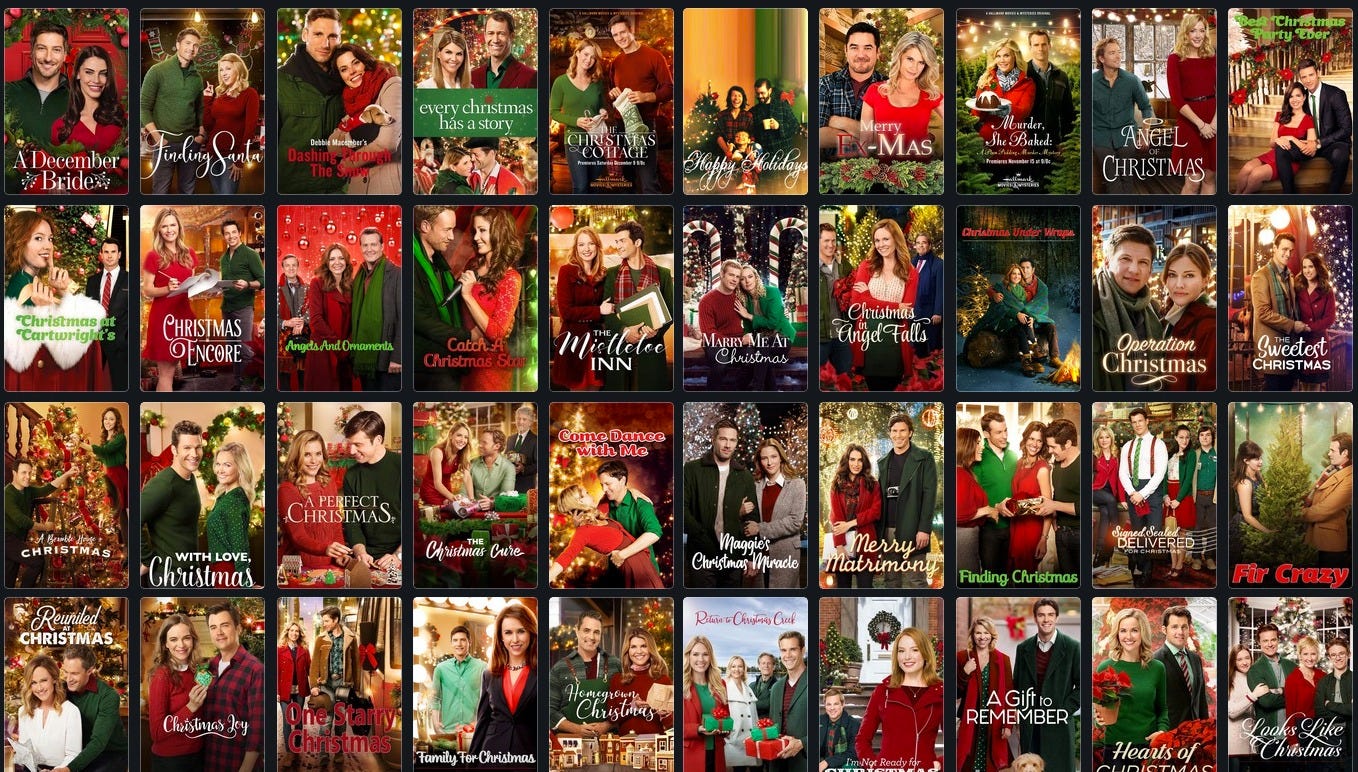Is Hallmark the FOX News of Christmas?
How classic Christmas movies can deepen our cultural divide.
A few Christmases ago, I was at my future in-laws' house. At this time of year, their halls are absolutely decked for Christmas. There are lights galore inside and out, a snowy townscape in the windows, and the Christmas tree goes up well before Thanksgiving. Naturally, as a perfect complement to this holiday cheer, the TV is often tuned to Hallmark, with beautiful couples falling in love around the clock.
I, like many, found a guilty pleasure in these movies; the formulaic plots, the unabashed joy, and (dare I say) camp of it all made me smile. But after watching movie after movie, I started feeling something besides Christmas cheer: a sort of lurking unease. Finally, at the end of yet another marathon viewing, I turned to my fiance and said, "Well of course small-town Americans hate city people, look at how we're portrayed in every single one of these films."
Like it or not, the subliminal messaging in Hallmark Christmas movies starts by turning small towns against cities, then warns against the dangers of change and reinforces this with an unrealistic and unhealthy sentiment about love. As a Queer person who lives in a city and who loves outside of the Hallmark box, let me explain.
If you’re already intrigued, it would really mean a lot to me if you hit that subscribe button. This newsletter is a free labor of love and your subscription is the best way for me to feel that love back from you!
My Personal Christmas Past
Now, I've never been a big Christmas movie kind of person. This could be because I grew up in Hawaii, where there's an understandable disconnect while watching White Christmas, but looking out at palm trees. Or it could be because my family wasn't big on traditions. By the time I came along, my eldest sister was in college, and my brother was in boarding school, so my family adapted every Christmas. I don't think we ever celebrated in the same place two years in a row. So, we never had the yearly tradition of turning on the same comfort classics other families did. But that gives me a fresh lens through which to view these films, free of nostalgia.
Now, before I get too far, I know there are exceptions, but I'll be exploring just the classic Hallmark Christmas movie archetypes and the overarching culture they exist in.
The Holiday Formula
Most Christmas movies are remarkably formulaic. The main character (usually a woman) leaves her happy city life to return to her hometown to deal with a Christmas Crisis. While at home, she has a chance encounter with the romantic lead, who is the only one who can help her solve said crisis. Near the end of the movie, there's usually a classic misunderstanding or the arrival of a city boyfriend to add a little bit of tension. But then, through a sprinkle of Christmas magic, our heroine decides to leave her soulless corporate job and return home to spend her life with her hometown love. Don't believe me? This photo shows exactly how interchangeable these plot points can be.
These stories aren't new, either. The themes in these movies and many other classic Christmas tales are basically just reworkings of A Christmas Carol. These original stories came about during the dawn of industrialization when the world was rapidly changing, and people longed for a simpler time. Turns out, they still are. These films play a vital role in alleviating the strain of a very stressful season through formulaic comfort. You know exactly what you're going to get, and there are never any real twists or turns that deviate from the carefully crafted structure. They're a perfectly wrapped piece of escapism designed mainly to comfort the women who do so much unappreciated work over the holidays.
This quote from Tom Zammarelli of Bryant University sums up exactly why they thrive.
"People watch Hallmark movies because they're optimistic.
There's so much negativity and divisiveness today, but you turn on one
of those movies and there's a certain hope [and nostalgia] there."
But that optimism, hope, and nostalgia only idealize small-town life and have deeper implications for those outside that mold.
What's The Problem?
Every story has to have an antagonist. When you're writing a story about small towns, family, and tradition, it's natural that the antagonists would be cities, work, and change. I understand that from a storytelling standpoint, but film after film, day after day, it begins to create an us vs. them mentality, which is why I titled this article the way I did.
Hallmark tells stories like a local FOX news channel. It's not like big FOX News propaganda, but they still deliver your local stories with a constant, low-grade traditional tilt. That traditional tilt in holiday movies is particularly troubling because the main antagonists in the films are things that are vital to many Queer folks: cities, our ability to change, and the many ways we love.
The negative messaging about cities can have real-world implications, making people resist the idea of leaving home to change and reinforcing this monolithic view of life and love.
Small Town vs. City
The current cultural divide in this country is so wide it seems insurmountable. We're constantly being pitted against each other as country bumpkins vs. city elitists, and I know something about both of these lifestyles. I grew up in a yurt in the rainforest with no neighbors; I graduated from high school with 27 other students and moved straight to Manhattan. I'm a perfect example of a transplant from a small town to a big city. I share this in common with so many other Queer folks who have set out to find community among towering skyscrapers.
I love cities and all the incredible things that come with them. What makes me sad is that there's no love in these movies for what makes cities truly incredible. Where are the stories about all the friends that you make in cities? Or the way that you learn and grow from other cultures? Or the way countless strangers can come together when they see someone in need?
Even the very fast-paced, work-forward city lifestyle is under fire. Work is the best enemy in every Christmas movie, from A Christmas Carol to Elf to The Santa Clause. There is no work-life balance in these movies as the scale starts on the work end and ends on the life end. Our heroine always gives up her six-figure salary because she learns that money is not as important as the true love she just found.
With enough of these movies following this exact plot (just look at the posters below), you can't blame people for ingesting what Hallmark says about cities or those who live in them. Storytelling and repetition are how we humans learn. And while I hope it isn't malicious, the messaging can negatively impact how people exist in the real world, all wrapped in the guise of tradition and nostalgia.
Nostalgia vs. Change
Nostalgia is a remarkably potent tool for businesses. We all love the thought of a simpler time, and we'll buy anything to give us a taste of that bliss. That's why change is so toxic in Christmas films. Throughout our heroine's journey, she usually realizes that she was wrong for leaving home in the first place. This capitalizes on a parent's longing for their children to return home, a completely understandable desire. But many of the lessons learned in these films go beyond parental love to some variation of, "See what bad things happened when you left home and changed?"
For so many Queer folk, change is one thing that saves us. I had a very loving and accepting community in Hawaii, but I only knew a handful of Queer people. Moving to New York allowed me to see a breadth of previously unknown experiences. It allowed me to find mentors and role models who showed me what a happy and healthy Queer life could look like. And one of the biggest things I learned from my Queer community was all the different ways that we can love.
Fantasy vs. Reality
I love love. I think love and connection are why we exist on this planet. I also think that the stories we're told about love and the way love is often portrayed in our modern culture are remarkably harmful to healthy relationships. Unfortunately, Hallmark really only exalts an unrealistic, fantasy version of love.
Hallmark love is simple and feelings-first. The romances in these films are full of innocence, and while the protagonists are always classically attractive, there's no sensuality beneath their shared glances. The relationships accelerate within the scope of a few days and always culminate with a big declaration of feelings, and then, they never delve into what comes next. It's our modern-day "happily ever after."
These stories rely on the trope that once you see 'the one,' everything should just fall into place. Your partner should just 'get you,' and you should never have to talk about your problems because you don't have any (besides being unable to save the town Christmas Cookie Contest). They tell you that nothing in life is more important than love and that it's normal (dare I say expected) to give everything up for your one true soulmate.
Even when the protagonists are Queer, they still exist within the same heteronormative love formula. There's no celebrating what makes Queer love different. And there's so much that does since queer people have had to find their own ways to love for decades. This started because our love had to be secret, but now, we have fewer of the traditional life markers that heterosexual couples do. Many rules of relationships that work for straight people do not apply to Queer folk. That's why you see a higher percentage of non-heteronormative relationships in queer people. We're more likely to be open or monogamish or blur the lines between friends, lovers, and more just because our relationships have always been 'othered.'
So, when Hallmark repeats one traditional love story over and over, the viewer starts to build patterns about what love is supposed to be. These patterns give us unrealistic expectations, make us compare our relationships to these fake ones, and also don't show us the tools needed to engage in sustainable relationships, tools like effective communication, realistic expectations, and healthy conflict resolution. Those are all vital to thriving relationships.
Still, those healthier representations of relationships aren't fun, cozy, romantic, or Christmasy, so Hallmark stays away. When people switch to the Hallmark channel, they want to see fantasy, and I get it. I can't really fault Hallmark for churning out its signature and most profitable product.
A Note of Realism
I'm not demanding change from Hallmark. I know that they've been diversifying their content by making LGBTQ+ movies recently, and for that, I applaud them. I also believe that Hallmark is not where we need to go to move this conversation forward. They're not a company interested in pushing boundaries that way, and that's okay. I actually believe it would be more harmful for Queer Progress to demand that Hallmark change rather than look to other avenues. The first step for Hallmark middle Americans is to see that Queer people can be just like them. We're not, but we could be.
So, now you might be thinking, "Well Aidan, what are you asking then? What's your point?"
A Queerer Christmas Future
Since I know this will not be seen by Hallmark folks, I’m just asking you to think a little differently.
First, I want you to imagine something with me. Imagine what a reverse Hallmark movie could look like. A young Queer person leaves their small town to go to the big city for an incredible career opportunity. In the days leading up to Christmas, they meet new friends, run into some old ones, and have a meet-cute with this rugged stranger they fall in love with. Throughout the film, they learn the meaning of balance, love, holiday magic, and maybe even how to draw healthy boundaries with their family back home.
Wouldn't you want to watch that? I certainly would. A film like that could help show small-town Americans that the cities are not these soulless places they've been conditioned to believe. It could show them that accepting change can actually help families grow closer. It could even show them that when you open up your mindset, there are so much more and so many different types of Christmas magic out there in the world.
But before that incredible movie comes out, we can celebrate the Queer Holiday films that already exist simply by watching them! Take a break from the classics and stream something new this holiday season. To make it very easy for you, here is a list of 31 of them! In our society, we speak with our dollars and our attention. If companies see an increase in streams of their Queer holiday movies, they will be incentivized to make more of them. Plus, with the administration we are about to have, companies need to see that there is a fierce desire for Queer stories to be told.
After all this, if you just want a classic Hallmark love story that's uncomplicated and fantastic, watch it; that's so fine! The holidays are about feeling joy and comfort, so whatever will make you feel that way, do it. I hope, however, that after reading this, you'll be able to notice the little bits here and there where the us vs. them mentality appears. The first step to bridging this cultural divide we're living in is to notice what we are being told, when, and by whom. With a dedication to consuming a range of holiday films, you can have a front-row seat as we help redirect the holiday narrative.
No matter what you watch this holiday season or how you celebrate, I wish you so much cheer and joy through whatever festivities make you happy. Whether you celebrate with your biological family, chosen family, or with no one at all, this is a time for you to create and receive joy however you want. Know that there are folks out there who love you and that community is always closer than you think, no matter how dark these winter nights may seem.
Thank you so much for reading this article! If you’re new here and liked what you read, hit subscribe below for once-weekly, free articles like this one. If you’re already a subscriber, it would mean a lot if you tapped that little heart. It does wonders for the algorithms! Thanks :)









Thank you Aidan for this article - and for sharing a bit of your yurt-to-NYC story. You made me realize that as an older gay man who survived the AIDS crisis, I often cry at Hallmark movies with a romantic ache of what I DON'T have - but often that the missing thing is a "benchmark" of a traditional hetero relationship (since that is what I was surrounded by growing up). There are new benchmarks and I forget that. And I cry easily! :)
P.S. Aidan, your Christmas Consumerism article prompted me to make ornaments out of family photos to give to my nieces and nephew. A fun project, and super personal.